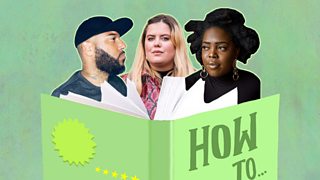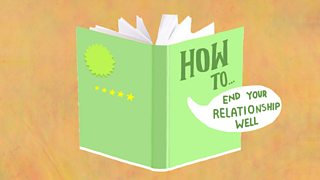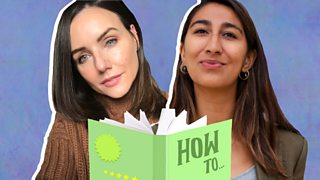How to be a good ally
Would you stand up for your friend if they were being discriminated against? Whether it’s racism, sexism, homophobia or something else, what’s the best way to speak out and support any friends or colleagues being targeted? For the latest instalment of Woman’s Hour’s how to series, we discussed what makes a good ally with freelance writer Danielle Dash, Chloe Laws - Glamour’s Social Media Editor and the founder of FGrls Club - and broadcaster Richie Brave, who hosts Brave Conversations on 主播大秀 Radio 1Xtra. Here they share their thoughts and advice...

Acknowledge and understand your privilege
“Being a good ally means realising your privilege exists - whether that’s because of your race, class, gender or something else - and that pretending it doesn’t exist doesn’t change anything,” says presenter Richie Brave. “We all have an obligation to do something to make sure that society is better for everybody.”
“I have white privilege, all white people do,” adds Chloe Laws. “This doesn't mean your life isn't hard. It means the colour of your skin isn't one of the factors making it harder. Once you've accepted this privilege is a real thing, and swallowed the guilt that comes with that realisation, you can then [work towards being] a better ally.”
“There is a fatigue that happens for me [when it’s racial discrimination],” says writer Danielle Dash. “But even though I am black, a woman and queer, there are people who are more marginalised than me and for their safety and protection, I never get tired of doing that work.”
Educate yourself and 'do the work'
“A good ally is someone who does a lot of reading and uses the sources around them – books, films, podcasts – to educate themselves, rather than constantly questioning individuals who are being oppressed by the system,” says Danielle.
“And it is work. It’s about actively unlearning the things that might seem normal but actually are oppressing someone else.”
“Don't assume the feelings of others, and don't homogenise groups of people,” adds Chloe.
“Consume books, art, media that step outside of your lived experience and look at your circle - are you living in an echo chamber? Do all your friends and colleagues look like you? It might be time to take a step out of your comfort zone.”
Never stop learning
“The learning is forever. Just when you think you know something, you realise you don’t know and you have to relearn,” says Richie.
“A good ally is someone who doesn’t centre themselves and someone who does more listening than talking,” says Danielle, who remembers a moment she herself was called out online.
“I interviewed the writer of a book about a young woman who couldn’t leave the house because of medical issues, and eventually she did. I was so proud of it and posted it [on social media] and didn't think anything of it. Then I started getting a lot of disabled people saying, ‘Why didn't you ask the writer about ableism?’ A friend of mine who is disabled explained to me that it's a trope that as soon as disabled people can live their lives like able bodied people, they will be living 'full lives'.
“I was so ashamed... It was a really hard lesson, because I think your pride and your ego gets in the way, but my feelings are not more valuable than their lived experience.”

Use whatever platform you have
“Being an ally to my closest friends, I think that's where it starts - and my social media platforms. Use any platform you have to de-centre your voice and amplify the voices of people who are less heard,” says Richie.
“The first time I remember being an ally was at 13 years of age. My best friend at the time went through quite a serious assault and she was judged based on what she was wearing and her personality and those kind of things. I used my voice to stick up for her and I think it's just continued ever since then.”
Call out discrimination when it happens
“Whenever you see someone being discriminated against, abused, or marginalised, speak up - if it is safe to do so,” says Chloe.
“As a white woman, I can step into a situation and I'm much less likely to face abuse or violence than a black woman would. In the same way, when men witness sexist behaviour or a woman being sexually harassed, it [can be] safer for them to step in than another woman.
“You are going to have seats at tables that other people won’t, and at that seat you then have to call out bad behaviour or racism or sexism. It's really just taking the onus away from people who are marginalised. For any significant change to happen it really does have to be a group effort.”
“For me I don’t have any tolerance for misogyny whatsoever,” says Richie. “[But] even with my friends who are quite aware of this sort of stuff, it’s about calling them out when they feel complacent. You can never be complacent in this.“
Social media is great but you need to act in real life too
“Allyship has to exist beyond the realms of social media,” says Danielle. “Tweeting #BlackLivesMatter or #MeToo isn’t enough. It starts small – calling out a derogatory term a family member might use, or bullying in the workplace.”
“It’s not enough to just say you’re not racist or you’re not homophobic anymore, you have to be actively anti those things,” adds Chloe.
“It's all well and good sharing activist tools online, but if you don't carry that into your everyday life, it counts as very little.
“Being an ally starts at home, with your family and friends, and challenging the people closest to you - as they are the people you can influence the most.”
Listen to the full Woman’s Hour discussion on 主播大秀 Sounds where you can also listen to every episode of Woman’s Hour. Follow us on and @bbcwomanshour.




